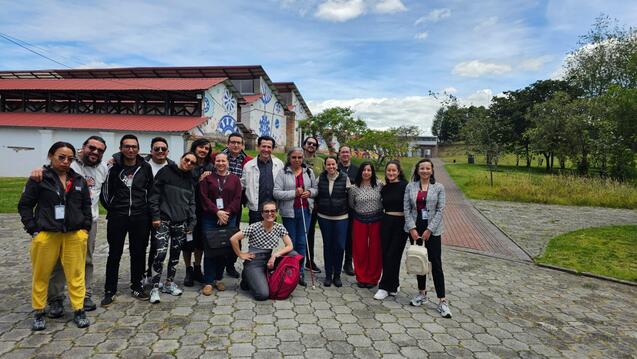USF Adopts AI Across the Curriculum

This academic year, USF has introduced artificial intelligence in classes all over campus. Here are some of the ways students are using AI.
In Rhetoric: Proceed with Caution
The rhetoric program discusses AI in all 90 writing and public speaking classes offered this semester, said Nicole Howell, associate professor. “We take a critical approach to AI: how it works, if we should use it, how to use it, and how to improve it.”
Howell said that AI is moving so fast she can’t keep up. So instead of pretending that she’s an expert in AI, she asks her students to learn about it with her.
“The other day in class I said, OK, so I heard about this thing called an AI audit. On your laptops, launch your favorite AI and give it this prompt: ‘Summarize Beyonce’s Cowboy Carter album in one paragraph.’ Repeat that prompt five times in the same AI and then we’ll analyze the results.”
Howell and her students discovered that one prompt, given five times to the same large language model, produced five answers, all similar but each slightly different from the other. “Those answers raised all kinds of questions about bias, privacy, accuracy, ethics — and about whether we should use AI to write,” Howell said. “Think about it: AI’s default language is Standard English, also known as white academic English. Do you really want to sound like a standard academic? Wouldn’t you rather sound like you?”
In Computer Science: Prepare for a Profession
New this semester, the computer science department offers an AI class for non-majors and an AI concentration for majors, said Ellen Veomett, associate professor and department chair.
In Computer Science 107, which welcomes students of all majors, students use tools like Thunkable, Bolt, Cursor, and Notebook to build software and create videos, Veomett said. “Thunkable is a visual coding tool: you drag and drop blocks to create app behavior without explicitly writing code. Piecing these blocks together, you can design how your app responds to user actions, manages data, and interacts with devices.”
To earn a concentration in AI, computer science majors take three courses, Veomett said. “One course is required: Foundations of AI. And then you choose two other AI courses from a list of options. You can learn how a neural network is constructed and trained. You can work on machine learning models and generative models. You can work on a predictive model — for example, predicting disease like skin cancer. You can teach a model to tell the difference between a mole and basal cell carcinoma.”
In Data Science: Learn by Doing
The MS in Data Science program has changed its name to the MS in Data Science and Artificial Intelligence program. “We added AI to our name to reflect the AI training we’ve been doing for the past few years,” said Shan Wang, associate professor and director of the program.
The 12-month program incorporates generative AI, large language modeling, deep learning for AI, AI engineering, and AI ethics and security. In the class called Machine Learning Operations, students build their own AI applications from scratch. Last spring, students developed UM.ai, a food-recommendation app; Llamapply, a job-search app; and FitAI, a fitness app with a virtual personal trainer.
The program includes a nine-month practicum, with a placement guaranteed for each student, Wang said. Students work part-time at companies and organizations such as BlackRock, the Environmental Defense Fund, Gates Foundation, the Golden State Warriors, Stanford, and in Target’s corporate offices. Last year, more than two-thirds of practicum projects were related to AI. At Bungalow, students built a pricing engine for co-living spaces using AI vision and large language models. At UCSF, students trained an AI model to predict glioma, a type of brain tumor. “We expect the same AI emphasis this year,” she said.
In Nursing: Listen to the Future
The School of Nursing and Health Professions is using AI, mannequins, and virtual reality to teach students communication skills, said Associate Dean Jonathan Mack. The school uses an AI simulation platform that can play more than 1,000 characters — patients, family members, or colleagues. These characters talk with students and give them feedback. “We’re early adopters of this technology,” Mack said. “Some of the things we’re doing with our students today haven’t even been added to textbooks yet.”
In Law: Adopt and Advance
In April, the USF School of Law became the first law school in the country to embed generative AI into its first-year curriculum, said Megan Hutchinson and Nicole Phillips, professors of legal writing. Students use AI in legal analysis and legal research, use iterative prompting to revise and improve AI outputs, evaluate AI-generated legal content, and explore ethical issues including confidentiality, bias, and the responsible use of emerging tech tools.
“The goal is to prepare students to work with emerging technologies in ways that reflect real-world legal practice — and do so professionally, with ethics and with sound judgment,” Hutchinson said. Phillips added: “By embedding GenAI into legal education, we’re making sure our students are ready not just to keep up, but to shape the future of the field.”
In Undergraduate Management: Do Better Business
This year, the School of Management has built ethics, generative AI, cloud technologies, and virtual reality into undergraduate courses to strengthen students’ foundational business skills, said Shivani Shukla, professor and associate dean. “For students in the business analytics major, the AI curriculum goes deeper with a range of applied-AI courses including Data Wrangling and Digital Analytics, a Python-based course that prepares students to work with complex data sources.”
In the Analytics for Good course, students work with local nonprofits on challenges like climate change, food insecurity, and public health, Shukla said. In Business Analytics Immersion, they compete in hackathon-style projects. “Last spring, in the Women in Data Science competition, one of our teams placed 16th out of 650 teams from all over the world.”
In Graduate Management: Prepare to Launch
The Masagung Graduate School of Management includes AI in assignments, projects, and discussions all across the curriculum, said Kourosh Dadgar, associate professor. In the new information systems course called Applied GenAI, students learn how AI tools work, which roles they play, which tools to use for which challenges, and how to use AI to automate tasks and to manage projects. And in the new Master in Management - Business Tech program, “we offer a required course called Fundamentals of GenAI. It’s an introduction to prompt engineering — essentially how to ask AI to do what you’d like it to do, and how to optimize AI to improve its precision or productivity or results.”
In the class called New Venture Launch, students use AI tools to create startups from scratch, said John Coughlan, director of the entrepreneurship and innovation program. “They use Venturekit to create business plans. They use Gamma to build presentation decks. One of our students created a social platform for finding lost dogs in China. Another created TalkShop, a peer-to-peer mentoring platform for high-school students exploring colleges and for college students exploring jobs.”
Coughlan added that while students learn how to use AI in this launch-a-business class, they also learn the limits of their technical ability. “Right next to you in class, or on campus, or in a cafe, you can find a technical person to be your co-founder. Only in San Francisco will you find so many tech-minded entrepreneurs.”


